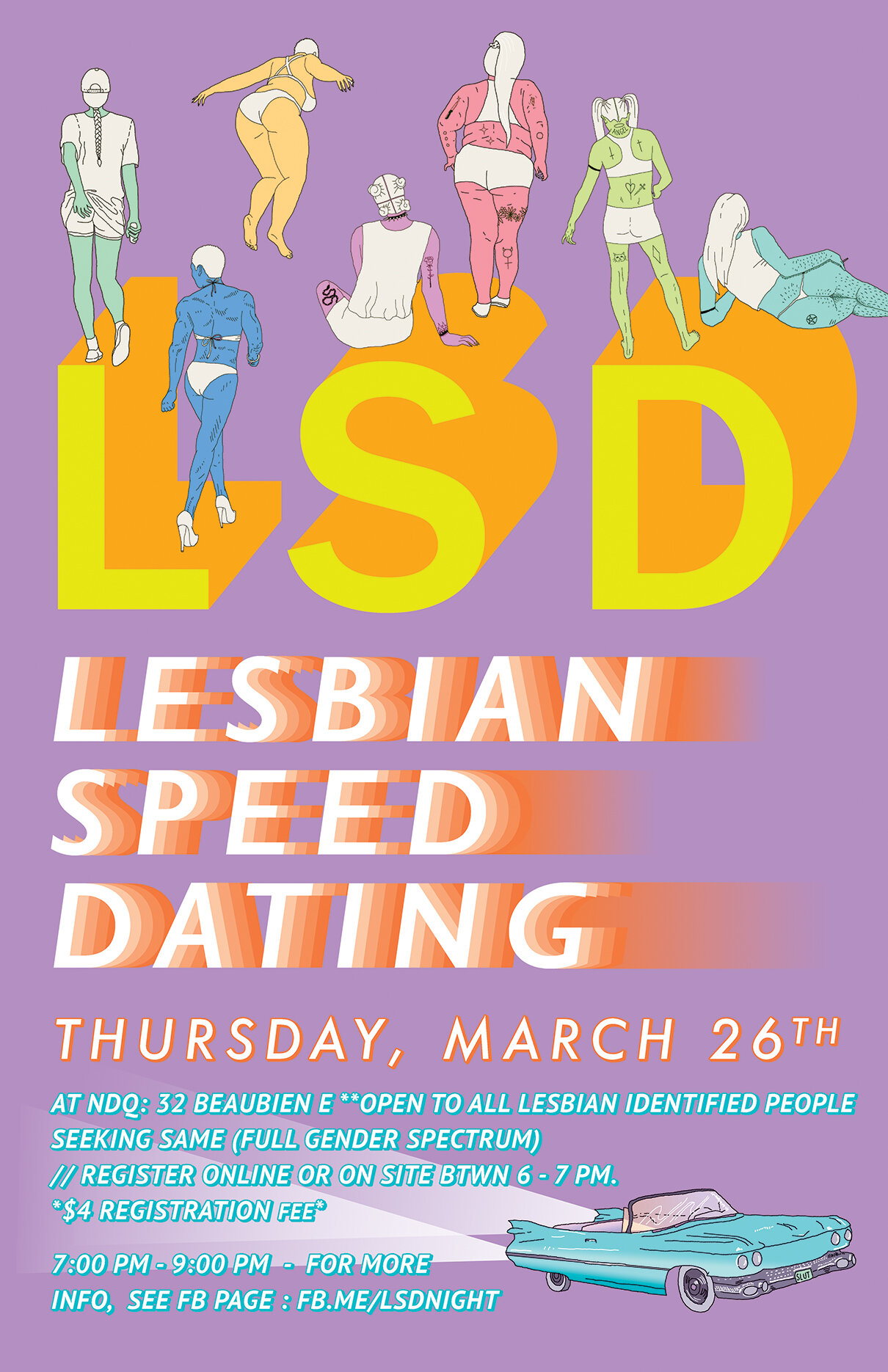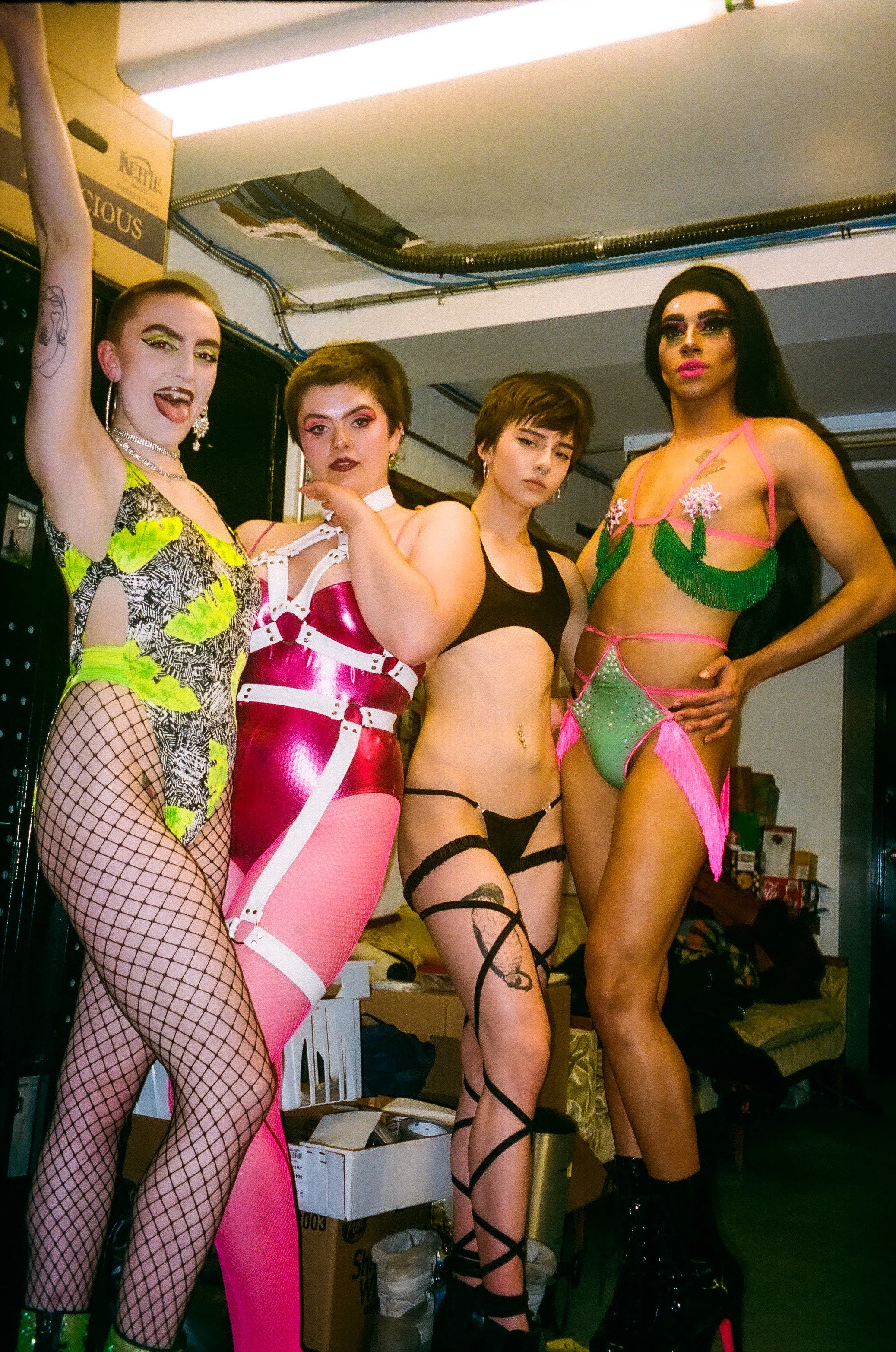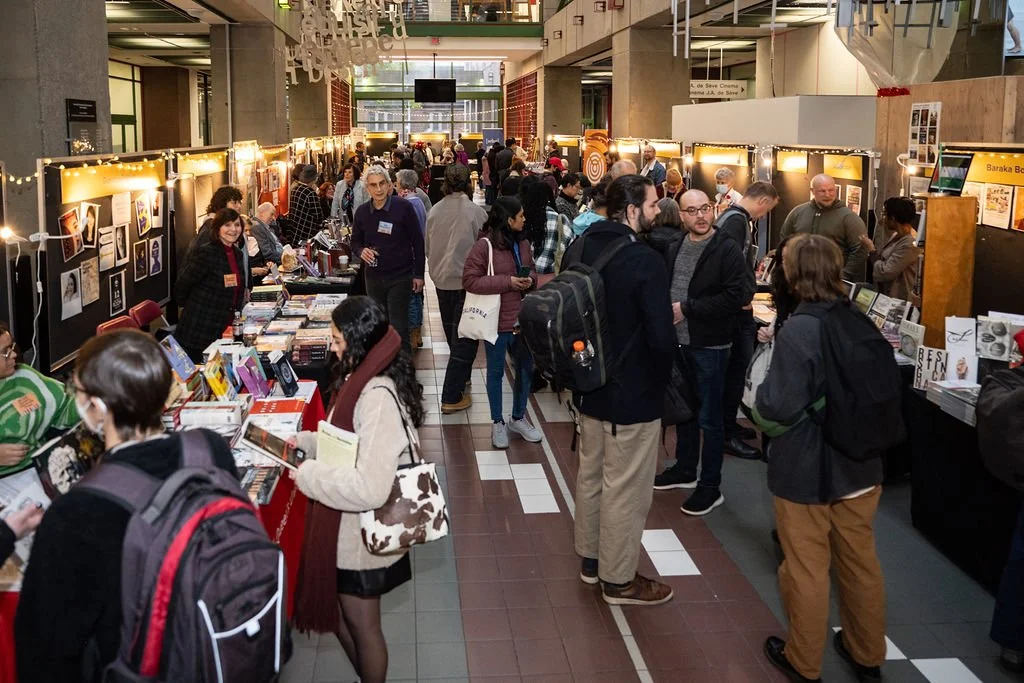LSD: Montreal's Intersectional Lesbian Speed Dating Event
Poster by Char Bataille
Carmen Colas (they/them) is the founder of LSD, Montreal's Lesbian Speed Dating event series. LSD is in its third year now, and while previous events have been held at NDQ, this edition will be held online on August 28th.
Carmen is a 30-year-old, mixed-race (White/Black/Indigenous), DJ, musician, event promoter, radio host, and writer. They are a self-described, "Chronically ill, trauma baby, and quintuple Cancer/Leo cusp." Carmen strives to promote healing and space for the people who have struggled to exist within the lesbian community. We caught up with them to chat about lesbian and queer culture, and connecting with community.
CW: Trauma related to homophobia
Poster by Char Bataille
Malaika for Also Cool: How did LSD start? What inspired you, and what do you hope the event offers the community?
Carmen: Lesbian Speed Dating came from a very charged momentum, which is more relevant than ever in these current pandemic times and social justice evolution climate.
How does one respect the legacy of history and individual identity while welcoming change, struggle, fluidity and room for exploration? How does one expand on the narrative that has been very one-dimensional and reductive for many, without erasing a very valid and singular experience? How do you create a lesbian space that goes beyond the white cis golden star narrative? How do you create a lesbian space with room for those who have no experience, or who have been confused/rejected/unsafe to come out or insecure and struggling to embody their truth?
How do you create space for trans women attempting to exist in lesbian spaces for the first time, and who come accompanied by a myriad of valid and complex fears? How do you create a lesbian space that acknowledges that many trans men have held a deep connection to lesbian spaces for many years, but who no longer feel relevant or welcome in these spaces now? How do you create a lesbian space that acknowledges that lesbians from previous generations don’t have anywhere to go to meet people and feel too old and too dated to exist in current lesbian spaces? How do you create a space for older lesbians who spent many years existing in lesbian bars and now struggle to find platforms to exist in, now that lesbian bars have become obsolete? Especially since some don’t necessarily have the knowledge and tools to comprehend the concept of trans and non-binary identity.
How do you create a lesbian space while acknowledging the disposability culture and compulsory hyper-sexualization of our community? How do you create a lesbian space while acknowledging fatphobia, ableism without having experienced these issues yourself?
These were all important questions that existed within me for many years. My experience with coming to terms with my identity was very non-linear. It was laced with racial, gender, sexual, emotional, and physical traumas.
Being able to fully embody your identity comes with a lot of barriers and challenges. Whether there are cultural barriers, like coming from a culture that does not accept homosexuality and remaining closeted to save your own life. It can be societal where you are born into a society that does not teach you that being gay, non-binary, and/or trans are real options for you. Or when your gender and sexuality are not yours to have, that an agenda is expected from you.
Rejecting people who have been through some heavy stuff to get to a point where they can be their best / full / honest selves — is violent. The whole purpose of this event is to make room for this journey that most of us go through as queers. The gruelling moment when you realize that society was not made for you and does not think about you when it embodies its structures. The feeling that certain labels don’t serve you and instead conditioning you to feeling inadequate, ostracized and imperfect.
I fought very hard to say the word lesbian out loud while talking about myself. I’ve been attacked, rejected from my family, have suffered gay interventions at school or via my parents, ridiculed, shamed for my compulsory heterosexuality, sexually assaulted by cis men and called a tease. I've been very depressed from not satisfying my true needs and identities. I've been punished by lesbian spaces for not having had the luxury of being a lesbian at a very young age, and for not having the experiences that many lesbians have until much later in life.
If we’re going to grow as a community, we need to acknowledge the global lesbian experience. We need to acknowledge heteronormativity, the patriarchy, violence, transphobia, homophobia, and cisnormativity. We need to acknowledge white supremacy, xenophobia, white privilege. We need to acknowledge fatphobia, ableism, ageism and this permeating fear of fluidity and non-linear experience.
LESBIAN is a valid identity, and I do not wish to take this away from its history and general interpretation. I just think that a lot of us have suffered trying to exist within this community without feeling like a failure. This is where my motivation came from. If I had the opportunity to exist in a platform like this one, I could have thrived as a teenager. I might even be a gold star lesbian, who knows. But circumstance is a thing. Privilege is a thing. Timing is a thing. Fear for your life and wellbeing is a thing, and so are non-binary and trans lesbians!
As a human and a host, I have struggled with imposter syndrome due to my experiences and realities. This event has been healing for me in a big way. It hasn't always been a perfect journey, but I think there should be room for mistakes, growth, healing and coming to terms with a peculiar form of grief. Grief that comes from all those years you spent struggling and denying yourself from being your fullest, truest and best self.
Also Cool: What have your events been like in the past, and how are you adapting to this new age of digital event production? What can we expect from this online edition of LSD?
Carmen: In the past, the platform was in physical form, so it was very different indeed! Not for the faint of heart, people would have up to 20-50 dates in one night, of about 3-4 minutes long each. Sometimes the event was so crowded that we couldn’t get everyone to meet everyone, but it was a great excuse to fill up the queer bar with the right kinda people.
It has been an absolute chaotic joy to witness the variety of people coming through, and the variety of social skills, flirting approaches and styles. It has also been an immense pleasure to help out the shy lesbians who are terrified of existing in lesbian spaces. It has been one of my most rewarding experiences. Since the beginning of this event, there have been three weddings and proposals, which is also amazing to witness.
The adjustment to transitioning online has been weird and labour intensive. Trying to figure out and adjust to what people’s needs are in a pandemic setting, while trying to unpack our community’s traumas. I decided to use Facebook as a platform because it was the most “accessible,” in my mind. (As far as visually being able to adjust font sizes, being familiar with the format, being able to use it on a computer or phone, and preserving anonymity.)
My take was trying to offer ambiguous results without the shallow scope of disposability/vapidity and projections. What happens when you can’t judge a book by its cover, and can’t project what someone looks like because all you have is their mind? An interesting concept to attempt, in my opinion. We’ll just have to wait and see what it creates.
Poster by Sultana Bambino
AC: What would your advice be to the baby queers, who are too shy to go to LSD for the first time, but really want to try?
Carmen: This particular event is PERFECT for shy people since you are anonymous and hidden. The online messaging format is great for going over your words, thinking about your answers, taking in all the emotions in privacy without the pressure of immediacy or someone staring at you. You can experiment with your desires and feelings without the anxiety of bumping into them IRL, having mutual friends, or projecting insecurities about yourself onto someone else because you’re nervous.
This is your chance to just be yourself and pick brains with someone else in an anonymous, ambiguous and no-pressure way. Revealing yourself is your own choice, at your own pace, and within the realms of your consent.
AC: How is LSD breaking down negative stereotypes and behaviours within the lesbian community?
Carmen: Honestly, I’m just trying to offer a lesbian space that acknowledges non-linear journeys, struggles, and barriers. I want to promote the notion that you can be a lesbian with no experience at any age. That you can struggle to reach a point where you feel safe and good about being a lesbian. That you can be non-binary and be a lesbian, you can be trans and be a lesbian. That European standards of beauty do not define what being a lesbian looks like, and that being a lesbian is more than just being “femme” or “butch” That being a lesbian can mean being aromantic/asexual. That being a lesbian can be difficult as much as it can be easy. That lesbians can be disabled, fat, chronically ill, neurodivergent, immunocompromised, healing from trauma, grieving…
There are so many different types of people with different realities, perspectives, backgrounds, and journeys, who can be and are lesbians. There needs to be room for that. There needs to be dialogue around this as a community, so that we stop policing each other into shame and ostracizing each other. It's a very touchy, messy, complicated and layered work to do. I’ve learned a lot over these past three years. It hasn't always been perfect, but it's been extremely eye-opening and rewarding.
ALSO it would be RUDE and messed up to not acknowledge the work being done by so many platforms, festivals, and event series in Montreal alongside this event. Many people are doing this work as well, and I am not the first, last or only one doing it.
AC: What’s the best way to support LSD right now?
Carmen: The only support this event needs is community presence. I’ve always maintained this project with the hopes that it helps people connect. Whether that's falling in love, exploring their sexuality, making friends, finding community, or healing from their individual journeys that led them to take up space here and now.
An important step to upholding the values I seek to instil in this event, is to donate money to the LSD Night Blind Date Bonanza Fundraiser. The fundraiser will be redirected to Taking What We Need about a week after the event is over. You can make a personal donation or participate in this event, and your cover charge will be used as a donation. You can also purchase some pre-sale LSD Night Blind Date Bonanza tote bags and t-shirts (sizes small to XXXL)
LSD




















